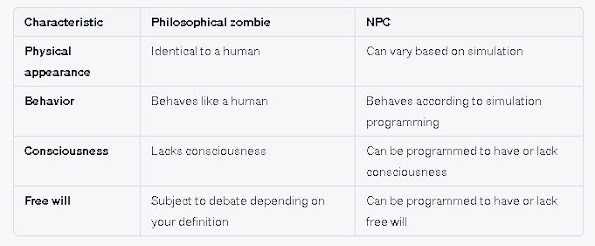Have you ever pondered the nature of consciousness and free will? These age-old questions have puzzled philosophers and thinkers for centuries. But in our quest for answers, we've stumbled upon two intriguing concepts: Philosophical zombies and NPCs (non-player characters). While they may seem like elements of science fiction or abstract philosophy, they offer a unique lens through which to examine the mysteries of the mind.
Philosophical zombies are hypothetical beings that share an eerie resemblance to humans. Physically identical in every way, they move, interact, and behave just like us. However, here's the mind-bending twist: they lack consciousness. They are void of subjective feelings or sensations, mere automatons in human form.
NPCs, on the other hand, come straight from the world of video games and simulations. They are characters controlled by computer algorithms, designed to mimic human behavior. While NPCs may act like us, they are fundamentally different—they lack consciousness, too.
Now, you might wonder, why are these hypothetical beings so essential to the realm of philosophy and science fiction?
Let's start by diving into the philosophical deep end. Philosophical zombies play a crucial role in challenging a perspective known as physicalism. Physicalism asserts that the mind is nothing more than the physical brain. It argues that since all the physical processes in the brain are deterministic (following fixed rules), consciousness must also be deterministic.
However, the existence of philosophical zombies raises a perplexing conundrum. If these beings can exist – physically identical to conscious humans but devoid of consciousness – it undermines the idea that consciousness is solely determined by physical processes. After all, if a philosophical zombie can behave exactly like a conscious person without having consciousness, it suggests that consciousness might be something beyond the physical.
Think of it as a philosophical game of "spot the difference." If you can't tell a conscious person apart from a philosophical zombie based on their actions, it implies that consciousness is a separate, non-physical entity, something that can't be reduced to deterministic physical processes.
While the debate about the existence of philosophical zombies continues, their presence in philosophical discussions reminds us of the tantalizing mysteries that surround the nature of our consciousness.
Now, let's shift our focus to NPCs – those characters that populate video games and simulations. In the realm of science fiction, NPCs are often used to explore the boundaries of consciousness and free will. Take, for instance, the iconic film *The Matrix*. In this dystopian world, humans believe they have free will, but in reality, they are merely NPCs in a simulated reality, their actions predetermined by the simulation.
The juxtaposition of NPCs with conscious beings forces us to grapple with profound questions about the nature of consciousness and free will. Can beings devoid of consciousness truly possess free will? Can the choices they make be considered genuine, or are they mere responses to programmed algorithms?
The table below provides a handy comparison of philosophical zombies and NPCs:
It's crucial to emphasize that both philosophical zombies and NPCs are hypothetical constructs. There is no concrete scientific evidence to suggest their existence. Instead, they serve as intellectual tools, inviting us to contemplate the intricacies of consciousness and the boundaries of determinism.
As we ponder these philosophical puzzles, it's important to recognize that the exploration of such concepts is not merely an abstract exercise. It touches on the very essence of what it means to be human, to possess consciousness, and to navigate a world where free will may be both a gift and a construct.
In our daily lives, we experience consciousness as a fundamental aspect of our existence. Our thoughts, emotions, and perceptions define our reality. However, the existence of philosophical zombies challenges us to question the true nature of consciousness. Could it be a mysterious force that transcends the physical, or is it, as physicalism posits, an emergent property of deterministic processes in the brain?
The realm of NPCs in science fiction prompts us to reflect on our own existence. Are we, too, mere players in a grand simulation, believing in our free will while unknowingly following a predetermined script? It's a thought-provoking idea that reminds us to cherish our conscious experiences and the choices we make, even in a world where the boundaries between the real and the simulated may blur.
In the end, the existence of philosophical zombies and NPCs challenges us to venture into the uncharted territory of the mind. They beckon us to explore the depths of consciousness, to question the nature of free will, and to seek answers to the eternal mysteries of our existence. Whether they are hypothetical or not, these concepts remind us that the quest for understanding our own consciousness is an endeavor worth pursuing, one that continues to captivate the human imagination and drive our philosophical inquiries.



